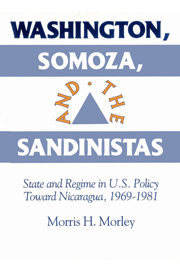Book contents
- Frontmatter
- Contents
- Acknowledgments
- 1 Introduction: Permanent and transitory interests in U.S. foreign policy
- 2 Washington and the Somoza dynasty: From consolidation to crisis of a client dictatorship
- 3 Supporting Somoza: Substance and symbol in American policy during the Nixon-Ford era
- 4 The Carter administration and Nicaragua: Human rights and the politics of accommodation
- 5 The Carter administration and Nicaragua: Mediation and the politics of frustration
- 6 Washington ruptures a historic relationship: Dumping the dictator to save the state
- 7 The Carter administration and revolutionary Nicaragua: Containing Sandinista power
- 8 Conclusion
- Bibliography
- Index
8 - Conclusion
Published online by Cambridge University Press: 31 March 2010
- Frontmatter
- Contents
- Acknowledgments
- 1 Introduction: Permanent and transitory interests in U.S. foreign policy
- 2 Washington and the Somoza dynasty: From consolidation to crisis of a client dictatorship
- 3 Supporting Somoza: Substance and symbol in American policy during the Nixon-Ford era
- 4 The Carter administration and Nicaragua: Human rights and the politics of accommodation
- 5 The Carter administration and Nicaragua: Mediation and the politics of frustration
- 6 Washington ruptures a historic relationship: Dumping the dictator to save the state
- 7 The Carter administration and revolutionary Nicaragua: Containing Sandinista power
- 8 Conclusion
- Bibliography
- Index
Summary
The shifts and changes in American policy toward Nicaragua were dictated largely by movements in the level of the sociopolitical and class struggle between Somoza and his domestic adversaries. Between the 1950s and mid- 1970s, U.S. policymakers accommodated a family dictatorship that firmly controlled the polity and state, and unquestionly supported Washington's global and regional goals. Throughout the Nixon-Ford era, neither protests by sectors of the local bourgeoisie nor lower-class discontent had any significant impact on the bilateral relationship. Washington was unmoved by this relatively low-level, uncoordinated opposition, which posed no serious challenge to the power of the client. The limited policy shift that occurred during the last year of the Ford presidency was primarily a response to increasing Congressional concern over human rights abuses in Nicaragua, which forced the administration to at least make private diplomatic efforts to encourage Somoza to halt National Guard “excesses.”
During the first 18 months of the Carter presidency, a groundswell of anti-regime sentiment manifested itself in two failed attempts to oust Somoza from power: a guerrilla-led insurrectionary challenge in October 1977 and a general strike organized by the civilian opposition in January 1978. In response, the administration stepped up criticism of Somoza's repressive rule and lack of tactical flexibility on the one hand; and expanded ties with the anti-regime civilian leadership as part of an effort to promote some kind of power-sharing arrangement with the dictatorship, and limited reforms, on the other. But the White House indicated no desire to move beyond censuring aspects of the client's authoritarian governance; senior officials did not, for example, contemplate any fundamental rupture in economic and military aid programs.
- Type
- Chapter
- Information
- Washington, Somoza and the SandinistasStage and Regime in US Policy toward Nicaragua 1969–1981, pp. 308 - 318Publisher: Cambridge University PressPrint publication year: 1994



